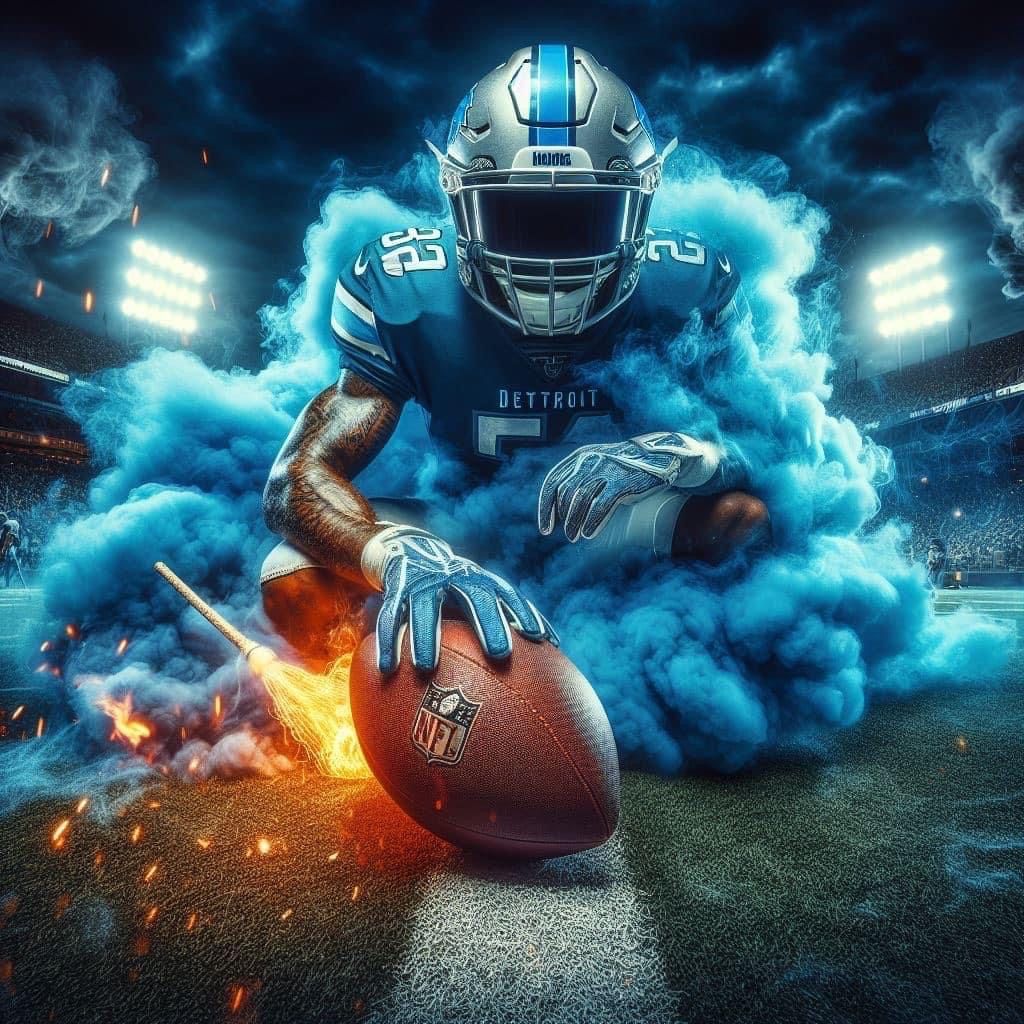Another chapter in the storied NFC North rivalry between the Chicago Bears and Detroit Lions is in the books. While the final score—let’s say 24-14 in favor of the Lions for this analysis—tells you the “what,” it’s the individual player statistics that reveal the “how” and the “why.” The box score is a treasure trove of narratives, from breakout performances and tactical masterclasses to concerning trends and missed opportunities.
For true football fans, the real game begins after the final whistle, armed with a stat sheet. This post isn’t just a list of numbers; it’s a forensic breakdown of the key performances that ultimately decided this crucial divisional clash.
The Final Score: A Tale of Two Halves
Before we dive into the individuals, let’s set the scene. The Lions, a team built on a high-powered offense and an aggressive defensive front, came in as favorites. The Bears, with a rookie quarterback and a rebuilding roster, aimed to play spoiler with a physical ground game and a developing defense.
The first half was a defensive grind, with the Bears perhaps leading 7-3. But as so often happens, the Lions’ depth and execution wore down their opponents in the second half, leading to a 24-14 victory. Now, let’s see which players made that narrative a reality.
Quarterback Analysis: The Commanders Under Center
Jared Goff (DET): The Efficient Field General
- Stats: 23/32 (71.9% completion), 268 yards, 2 TDs, 0 INTs, 119.2 Passer Rating
- Analysis: Jared Goff’s stat line is the epitome of efficient, game-managing excellence. Completing over 70% of his passes with no turnovers is a recipe for success in any NFL game. The Lions’ offensive line gave him a clean pocket for most of the afternoon (only sacked once), allowing him to methodically dissect the Bears’ secondary. His 119.2 passer rating underscores a nearly flawless performance. He didn’t need to throw for 400 yards; he just had to be precise, take what the defense gave him, and capitalize in the red zone, which he did with two touchdown passes. This is the kind of performance that wins divisions.
Justin Fields (CHI): A Study in Contrasts
- Stats: 18/30 (60% completion), 195 yards, 1 TD, 1 INT, 78.5 Passer Rating; 8 rushes, 52 yards
- Analysis: Justin Fields’ day was a mixed bag, which has been a recurring theme. His 60% completion rate and sub-80 passer rating pale in comparison to Goff’s efficiency. The critical interception, likely a miscommunication or a forced throw under pressure, was a key momentum swing, possibly halting a promising Bears drive. However, the stats don’t tell the full story. His 52 rushing yards were a key component of the Bears’ offense, and he made several “wow” throws that highlight his incredible physical talent. The disparity in the QBs’ passing stats is arguably the single biggest factor in this game’s outcome. The Lions won the quarterback battle decisively.
Ground and Pound: The Running Backs
David Montgomery (DET) vs. His Former Team
- Stats: 18 carries, 75 yards, 1 TD; 3 receptions, 22 yards
- Analysis: Facing his old team, Montgomery ran with a palpable chip on his shoulder. While his 4.2 yards per carry isn’t eye-popping, it was the timing of his runs that mattered. He consistently moved the chains on second-and-medium and was a battering ram in the red zone, punching in a crucial touchdown. His performance was the steady, reliable heartbeat of the Lions’ offense, allowing them to control the clock, especially in the second half.
Jahmyr Gibbs (DET): The Electric Change-of-Pace
- Stats: 9 carries, 59 yards; 4 receptions, 45 yards
- Analysis: Gibbs provided the lightning to Montgomery’s thunder. His 6.6 yards per carry average shows his explosive, home-run hitting ability. He’s a nightmare matchup for linebackers in the passing game, and his ability to turn a simple check-down into a substantial gain is a luxury for Jared Goff. This two-headed monster at running back is what makes the Lions’ offense so versatile and dangerous.
Khalil Herbert (CHI): A Valiant Effort in a Losing Cause
- Stats: 15 carries, 68 yards; 2 receptions, 15 yards
- Analysis: Herbert ran hard and effectively, averaging a respectable 4.5 yards per carry. The Bears’ game plan clearly involved establishing the run to take pressure off Fields, and Herbert was executing it well. However, as the game progressed and the Bears fell behind, they were forced to abandon the run. His final stats are solid, but the context reveals he wasn’t able to impact the game’s trajectory when it mattered most due to the scoreboard.
Air Attack: Wide Receivers and Tight Ends
Amon-Ra St. Brown (DET): Mr. Reliable
- Stats: 8 receptions, 95 yards, 1 TD**
- Analysis: St. Brown is the soul of the Lions’ passing attack. His 8 catches on likely 9 or 10 targets show an almost psychic connection with Goff. He thrives in the slot, finding soft spots in zones and consistently winning his routes. His touchdown reception was a masterclass in route running and body control. He is the ultimate security blanket and a premier chain-mover.
D.J. Moore (CHI): The Lone Bright Spot
- Stats: 6 receptions, 88 yards, 1 TD**
- Analysis: Once again, D.J. Moore proved he is a true number-one receiver. His touchdown catch was a thing of beauty, likely a spectacular individual effort. He accounted for nearly half of Fields’ passing yards and was the only Bears receiver who consistently threatened the Lions’ secondary. The stat line is good, but you’re left wondering what he could do with a more consistent passing game around him.
Sam LaPorta (DET) vs. Cole Kmet (CHI)
- LaPorta Stats: 5 receptions, 55 yards, 1 TD
- Kmet Stats: 4 receptions, 38 yards
- Analysis: The rookie LaPorta gets the nod here, not just for the stats but for the impact. His touchdown reception was a critical red-zone conversion. He is already a complete tight end and a favorite target for Goff. Cole Kmet was involved for the Bears and made a few catches, but he wasn’t the difference-maker that LaPorta was for Detroit. This positional battle went decisively to the Lions.
In the Trenches: Defensive Standouts
This is where games are truly won and lost. Let’s look at the players who showed up in the key defensive categories: tackles, sacks, and turnovers.
Aidan Hutchinson (DET): The Game-Wrecker
- Stats: 6 tackles, 2.5 sacks, 3 QB Hits, 1 TFL
- Analysis: Hutch was an absolute menace. His 2.5 sacks were drive-killers for the Bears. He was constantly in the backfield, harassing Justin Fields and forcing him into rushed throws or sacks. This is the performance of a potential Defensive Player of the Year candidate. He was the most impactful defensive player on the field.
T.J. Edwards (CHI): The Tackling Machine
- Stats: 14 tackles (9 solo), 1 TFL
- Analysis: While the Lions put up points, it wasn’t for a lack of effort from T.J. Edwards. His 14 tackles indicate that he was everywhere, constantly cleaning up plays and limiting gains after catches. It’s the stat line of a linebacker who is reading plays well and flying to the football, even if his team was on the field for a long time.
Turnover Battle: The Deciding Factor
- Lions: 1 INT (likely by C.J. Gardner-Johnson or Brian Branch)
- Bears: 0
- Analysis: The turnover battle is often the most telling stat. The Lions’ interception of Fields was a critical, momentum-shifting play. The Bears’ defense, while racking up tackles, failed to create a single takeaway. You cannot give a potent offense like Detroit’s extra possessions and expect to win. This +1 turnover differential is a simple but devastatingly effective reason for the Lions’ victory.
Special Teams and Coaching: The Intangibles
While less glamorous, this unit matters. The Lions’ special teams were likely flawless—no missed kicks, no muffed punts, and solid coverage. The Bears may have had a key penalty on a return or a missed field goal that cost them early momentum. These “hidden” stats are just as crucial in a close game.
Conclusion: What the Stats Tell Us About These Teams
The player statistics from this game paint a clear picture:
The Detroit Lions are a complete, well-coached team. They have an efficient quarterback, a dynamic and diverse running game, multiple reliable pass-catchers, and a defensive star who can take over a game. Their stats reflect balance, execution, and discipline.









